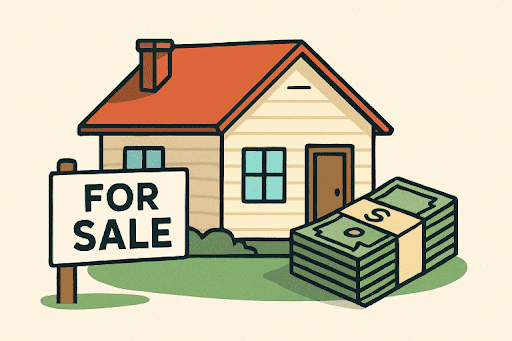Main Points
- Understand the benefits and challenges of cash sales.
- Prepare your home to attract cash buyers.
- Set a competitive price based on market research.
- Vet potential buyers to avoid scams.
- Be ready for a swift closing process.
For homeowners seeking speed, certainty, or relief from the burdens of repairs and traditional sales processes, selling your property for cash can be an attractive solution. In today’s dynamic real estate market, understanding the intricacies of cash transactions is crucial for making informed decisions. If you need to sell house as-is, there are practical steps you can take to ensure a quick and stress-free experience. However, maximizing your outcome requires thoughtful preparation and a strategic approach.
We break down the crucial aspects of preparing your home, attracting trustworthy buyers, setting the right price, and navigating legal requirements. Whether you’re facing a tight timeline, relocating, or simply prefer the certainty of a cash offer, these tips will help you make the most of the process while safeguarding your interests.
While cash transactions eliminate much of the red tape and uncertainty associated with bank-financed deals, sellers should be aware of common pitfalls and thoroughly vet potential buyers. Following the right steps can help you avoid costly mistakes and achieve a fair price for your home.
Understanding Cash Sales
Cash sales often bypass many of the delays and complications associated with traditional real estate transactions. Without the need for mortgage approval or bank appraisals, deals can close in a matter of days rather than weeks or months. The certainty of knowing your sale won’t fall through due to financing is a major advantage. Yet, these quick deals often come with buyers expecting discounted prices due to the convenience and speed they offer, as noted by industry experts at Bankrate.
Preparing Your Home for Cash Buyers
First impressions play a critical role in attracting cash buyers. Enhancing curb appeal by mowing the lawn, updating landscaping, or simply painting the front door can increase perceived value. Once inside, ensure your home is free of clutter and personal items—buyers want to visualize their own future in the space. Tackle easy yet visible repairs, such as dripping faucets, outdated light fixtures, or squeaky doors. According to the National Association of Realtors, these moves can boost your sale price by as much as 10% over similar homes lacking curb appeal.
Even if you’re planning to sell your home “as-is,” a modest investment in repairs can yield a strong return or differentiate your property in a competitive market. Presentation matters, regardless of who your target buyers are.
Setting the Right Price
Pricing a home for a cash sale requires balancing market data with buyer expectations for discounts. Review recent sales of comparable homes in your area to set a competitive asking price—resources like Zillow Research provide valuable insights. While you want to attract buyers quickly, avoid underpricing yourself or failing to account for the home’s unique features. If in doubt, obtaining a professional appraisal can help validate your pricing strategy and serve as a reliable tool for negotiation
Finding and Vetting Cash Buyers
The appeal of a speedy sale shouldn’t overshadow the need for due diligence. Not all cash buyers, whether individuals or companies, are created equal. Begin by checking online reviews and requesting references from previous sellers. Confirm proof of funds before proceeding, and be cautious of buyers who demand upfront fees or pressure you into making snap decisions. When in doubt, a real estate attorney can be a key ally—helping you review offers and safeguard your interests throughout a potentially fast-paced negotiation process.
How to Spot Red Flags
- Buyers are reluctant to share proof of funds or references
- Pressure tactics urging a rushed decision
- Terms that seem too good to be true, especially regarding large deposits before due diligence
Negotiating the Sale
Negotiation in a cash sale largely focuses on price, closing date, and contingencies. While speed is often the priority for buyers, flexibility—like accommodating the buyer’s desired timeline—can translate into a better offer. Be honest about your home’s condition, as hidden issues may sour a deal during due diligence. Transparency not only helps negotiations but also builds trust, often leading to smoother closings and fewer last-minute complications.
Preparing for a Quick Closing
Cash transactions typically usher in faster closings, but organization is crucial for a mistake-free finish. Gather all documents early, including:
- Title deed and identification
- Property tax and utility records
- Required local and state disclosures
- Any warranties on systems or appliances included in the sale
Ensuring these are on hand will demonstrate to the buyer that you are ready and respectful of their time, further increasing buyer confidence.
Understanding Legal Implications
Laws governing real estate sales can vary significantly from state to state and locality to locality. Compliance with disclosure regulations is mandatory, and improperly completed paperwork can result in delays or legal exposure. Consulting with a qualified real estate attorney can provide peace of mind, ensure a smooth transfer of ownership, and help you avoid overlooked obligations.
Conclusion
Selling your house for cash offers a rapid, hassle-free way to transition to your next chapter—provided you enter the process with the right knowledge and resources. By meticulously preparing your home, setting a smart price, diligently vetting buyers, and understanding your legal obligations, you can secure a sale that is both swift and fair. While the prospect of quick closings is appealing, never compromise on due diligence or legal protection to ensure a successful and stress-free transaction.





























